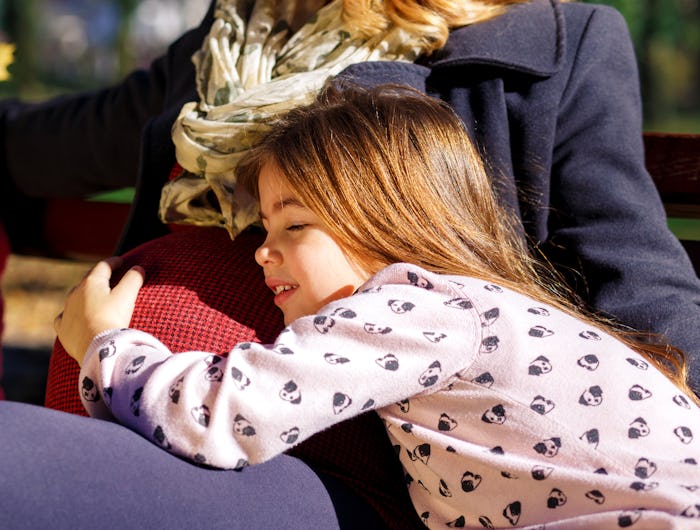Life

10 Signs You Don't Need To Worry About The Age Gap Between Your Kids
As a sibling to a sister 13 months older and a brother 8 years younger, I'm well-versed in age gap dynamics. That's why I wanted my kids to be close together. Life (read: a miscarriage and deployment) had other plans, though. I'm currently expecting our second child, and, as a result, our kids will be 3 years apart. It's not what I'd pictured, but I've come to the conclusion that we parents give the whole "spacing of kids" things too much significance. These signs that you don't need to worry about the age gap between your kids prove me right, too.
Conventional wisdom says an age gap of at least 18 months to two years is ideal. It makes sense. It's enough time to let your body recover and you're still in "baby mode." Citing demographic surveys, Parents says two to three years is the American average for age gap. According to the Centers for Disease Control and Prevention (CDC), 17.5 percent of American families have a 13 to 24 month gap between first and second children compared to 17.2 percent with a 25-36 month difference. Experts can tell us what's optimal or typical, but they know as well as we do that family planning isn't that straightforward.
You might have very specific ideas of what your family should look like, but miscarriage or secondary infertility can throw a wrench in your plans. If you're pushing advanced maternal age, you may be looking to try for another baby before you're really "ready." Or, like my mom, an unexpected pregnancy (i.e. me) can leave you with a set of Irish twins. A career change or financial constraints can also place limitations on the spacing of your children.
Sure, you can stress about sibling rivalry, but I think it's worth remembering that all age gaps have pros and cons. Frankly, I think we put too much emphasis on the numbers. In the interest of accentuating the positive, keep an eye out for these signs and let them ease your worried mind:
Your Kids Are Great Playmates
Concerned about your back-to-back kids? One of the perks is that children born close together generally play well together. They'll love having a built-in companion, and you will, too. Another great harbinger? A friendship that stands the test of time.
Your Children Have Good Problem-Solving Skills
It's not like your close-in-age kids aren't going to fight (hello, road trip squabbles), but they'll be pretty motivated to work through disagreements. After all, it's hard to play hide-and-seek when your seeker is pissed off at you. Seeing effective conflict resolution? Yeah, your kids are going to be just fine.
Your Kids Share Interests
Siblings with close birthdays often enjoy similar hobbies. OK, so they might not be ice dancing partners, but if your kids are on the same soccer team, have the same friends, or will happily sit together to watch Llama Llama, you can rest assured that being close in age hasn't hurt them.
Your Older Child Has Taken On The Role Of Mentor And/Or Helper
Fringe benefits aren't relegated to small age gap siblings. A reassuring sign your eldest is handling the change well is when they help out with the new arrival. Older kids can fetch diapers or give a bottle and, later on, can be instrumental roles models when their younger sibling takes on tasks like potty training.
Your Eldest Is (Relatively) Independent
Your spaced out kiddos might not play together that much, but you can be proud of your older child acting like a "big girl" or "big boy." Their displays of independence in feeding, dressing, and sleeping are a great indication that the age gap is working out.
Your Older Child Is Secure In Their Bond With You
A larger age gap means you've had ample one-on-one time with your firstborn. If you don't see signs of jealousy (such as physical aggression), you know that your eldest is securely attached to you. In fact, the significant gap is actually good for their self-esteem.
Your Kids Share
Holding your breath as your baby makes a grab at their sibling's favorite stuffy? Big brother or sister might just surprise you. Acts of selflessness are a surefire sign your family dynamics are solid.
Your Children Show Each Other Genuine Affection
According to Parents, 4- and 5-year-olds are capable of demonstrating compassion and empathy. Those sweet hugs and kisses your older child gently gives your newborn are a positive predictor of everyone's happiness.
You & Your Partner Are A Unified Team
According to the Alpha Parent, the hardships of a one year age gap are the best at unifying the family. Honestly, though, as long are you and your partner are a united front, whether it's tandem diaper changes or dividing and conquering at Open House nights at different schools, the age difference between your kids shouldn't matter.
You're In A Good Place Personally
As my mother likes to say, "If mama ain't happy, ain't nobody happy." Examine your own level of satisfaction. Are things going well with your career? How is your mental and emotional health? Your wellbeing is probably the biggest indicator that the age gap between your children is really no big deal.
Check out Romper's new video series, Bearing The Motherload, where disagreeing parents from different sides of an issue sit down with a mediator and talk about how to support (and not judge) each other’s parenting perspectives. New episodes air Mondays on Facebook.